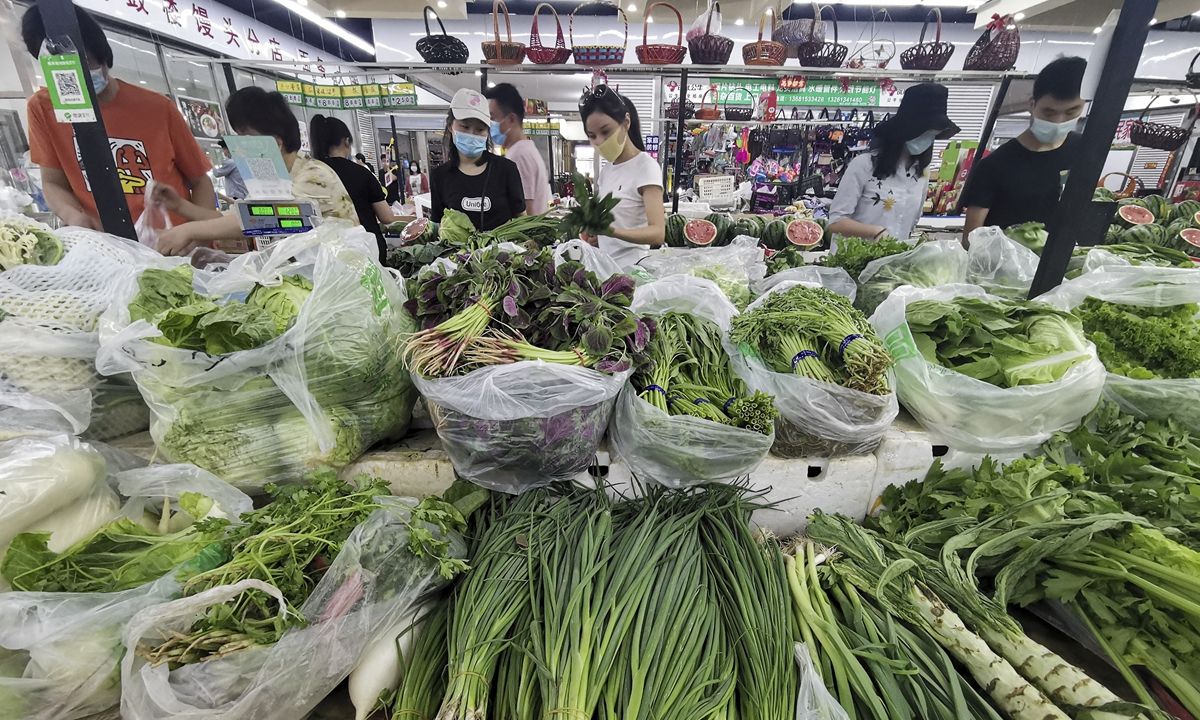Food market provides ideal environment for coronavirus spread: experts
By Xu Keyue and Zhang Hui Source:Global Times Published: 2020/6/16 21:38:40

A supermarket in Beijing has sufficient supplies on Sunday. Photo: cnsphoto
Beijing reported more than 100 cases of COVID-19 in the past five days, and most had close contact with a local wholesale food market, similar to the situation in Wuhan, Hubei Province where a cluster of patients was linked to a seafood market.
The similarity sparked renewed public concern over the cleanliness of such markets in China.
Domestic health experts said such markets are warm and humid, providing an ideal environment for viral transmission. That's a problem everywhere, and China should not be targeted.
As of Tuesday morning, 276 agricultural markets, and 33,173 catering service units including canteens and restaurants in Beijing, had been disinfected and 11 underground and semi-underground markets had been closed. All catering service units were to be disinfected by the end of Tuesday, Beijing authorities said.
A further 27 new cases were confirmed on Monday in Beijing, bringing the five-day total to 106. Most of the patients had been to Xinfadi Market, the largest such facility in the capital city, while others had been to the Yuquandong market in Haidian district.
The incident reminded people of the outbreak in January in Wuhan and sparked public calls for a further investigation and explanation of the relationship between markets and the virus.
Zeng Guang, chief epidemiologist of the Chinese Center for Disease Control and Prevention, told the Global Times on Tuesday that such markets are prone to coronavirus infections because of their chilly environment, which provides a suitable environment for the virus to thrive.
Zeng said that seafood was probably not an intermediate host that transmitted the virus to humans. The virus was probably transmitted via contaminated goods, such as seafood and meat, to humans, experts noted.
Beijing health authorities said the virus they detected in samples collected in Xinfadi Market was more similar to strains spreading in Europe rather than those in China. Positive samples were detected from those collected on chopping boards used to process salmon.
Yang Zhanqiu, a deputy director of the pathogen biology department at Wuhan University, told the Global Times on Tuesday that the coronavirus could survive for weeks in wet, chilly markets. "It's an ideal environment for viruses to live and be transmitted," said Yang.
Such conditions can be found around the world, experts said.
Research indicates that food or farmers' markets that offer live poultry may be a source for avian influenza, in which healthy live birds may carry the virus. This was previously shown in Hanoi, Vietnam, in 2001, where the H5N1 virus was detected in domestic birds in a live bird market.
Illegal trading in wet markets of wildlife that have not undergone health checks increases the risk of infectious disease outbreaks. The COVID-19 outbreak at the Huanan seafood market in Wuhan is the latest example.
China has been toughening bans on wildlife trade and provisions to protect these animals following the COVID-19 outbreak.
On February 24, the Standing Committee of the National People's Congress, China's top legislative body, adopted a decision to thoroughly ban the illegal trading and consumption of wildlife.
South China's Guangdong Province became the first province to revise its regulations on wildlife protection on March 31, as a timely decision to follow the national decision to ban wildlife trade after the outbreak.
Posted in: SOCIETY,FOCUS